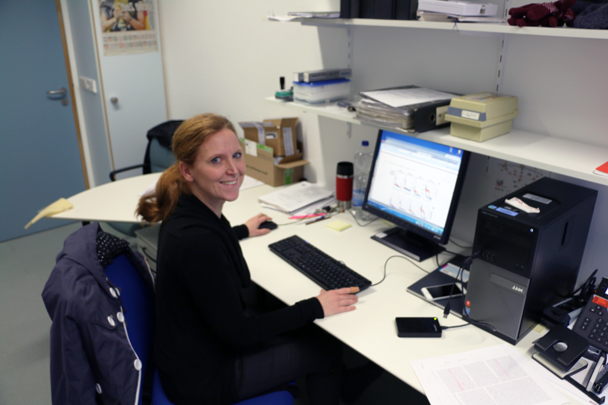
Dr. Myriam Peters. Photo: Levin Sottru
“Only one more email before I’m leaving to pick up my daughter at the nursery”, said the junior scientist and off she went. In one way or another this is daily routine in the life of many female scientists these days. That is, IF they are able to organize flexible work schedules. Achieving such freedom is a goal of equal opportunities commissioners in municipal institutions as well as for BrainLinks-BrainTools. The cluster of excellence has installed a “Welcome Back Fellowship” for the re-entry of female scientists after a break.
Mothers re-entering the job market after giving birth to a child is essentially nothing new: According to the latest “Familienreport” of the German government there is a long-lasting trend towards more female employment. In a survey associated with the report 81% of people in the age range of 20 to 39 years are of the opinion that both partners should be responsible for earning income. The wish to go back to work is however often incompatible with adequate child care and education, which means that the successful combination of work and family life remains a much discussed topic. On the job, this is about granting employees more individual flexibility and consequently facilitating a healthy work/life-balance. This sounds easier than it is. A quickly changing job market as well as succeeding competitors require work returners to be highly adaptive. In this respect it is no surprise that mothers rarely continue with the same work they did before childbirth.
BrainLinks-BrainTools is currently employing three fellows in different part-time models (50 to 75%). All of these returners have entered new territory: Dr. Anna Holt, scientific staff member at Prof. Dr. Roland Zengerle’s Laboratory for MEMS Applications, had been working in the field of molecular biology of plants before her parental leave; Dr. Myriam Peters, who is concerned with dysplastic brain tissue in Prof. Dr. Carola Haas’ Experimental Epilepsy Research Group, was doing research on the neurobiology of strokes before she gave birth to her son; and Dr. Eva Schnober, formerly trained as a microbiologist, who is now working at Prof. Dr. Ilka Diester’s Optophysiology Lab. The example of Visnja Jevtic shows that the courage to change direction pays off. Jevtic, who studied microbiology in the USA, came to Germany with her husband and took a break for several years until she started at the BIOSS Toolbox with a Welcome Back Fellowship. However, she didn’t return to traditional science and research, but instead found herself focused on lab service and supervision. She enjoyed her new tasks very much and decided to take further steps in that direction. She did this with instant success. When her fellowship ended this February, she had already signed a work contract with the MPI-IE and could seamlessly switch hats.
By means of a scalable work schedule each stipendiary can adjust the personal working pensum to his/her personal and family needs. The length of the scholarship is determined by the work pensum. Eva Schnober first tested out 50% and then went up to 75%. Due to increasing responsibility, Anna Holt could soon be working even 100%. Her fellowship would in this case be shortened by a couple of months. Given that she is serving as a project leader she has excellent job prospects though. No matter how things turn out: all Welcome Back Fellows are pointing out that, looking for a job when you have one, feels much more relaxed. They also agree that their flexibility gives them the best opportunities for personal growth – at work and at home.